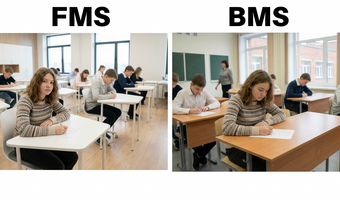

Basic skills are very important for lifelong learning
Lifelong learning can only work if basic skills are present, such as in German and mathematics. But reading skills in particular are steadily declining among Swiss students.
Attend preparation courses for grammar school early to avoid gaps!
Table of contents
What are basic skills?
According to Article 13 of the Swiss Federal Act on Continuing Education (WeBiG)basic skills in relation to lifelong learning are defined as follows:
"Basic skills for adults are prerequisites for lifelong learning and include fundamental knowledge and abilities in the following areas:
a. Reading, writing and oral expression in a national language;
b. basic knowledge of mathematics;
c. use of information and communication technologies."
Normally, adults should have learned these basic skills during their compulsory schooling. However, this is increasingly less the case among young people, even in Switzerland.
Reading skills of 15-year-olds are declining
Every three years, the OECD (Organisation for Economic Co-operation and Development) conducts an international school performance comparison known as the Pisa study, which shows that the reading skills of 15-year-olds have been declining since 2012 in Switzerland and other European countries, but also in the global OECD average.
The ‘Assessment of Basic Skills (ÜGK)’, which is only conducted in Switzerland, also concludes that reading skills are declining.
The two studies – Pisa and ÜGK – even show that at least one-fifth to one-quarter of pupils have not achieved the minimum level of competence. This means that the participating pupils are unable to find and then process the information explicitly formulated in a short text.
Other pupils achieve the minimum level of reading competence, but then fail when asked whether the text in question is reliable, comes from a trustworthy source and whether the text contains any contradictions. This group also accounted for almost a quarter of all participants in 2000.
Roughly speaking, it can be said that to date, around half of all 15-year-olds have insufficient or only rudimentary reading skills.
However, it is not only reading skills that are declining, but also the proportion of young people who read books for pleasure in their free time. Reading ability and enjoyment of reading reinforce each other. The decline in leisure reading may therefore also be a reason for the decline in reading ability.
Book an essay writing course now to improve your writing skills
Reading on screen even more challenging
The digital transformation has also made reading more difficult. When scrolling on a screen, it is easy to lose track of where you are in a text. Added to this are distractions from audiovisual elements and moving graphics.
According to research findings from 2018, it is more difficult to understand factual texts when reading them on screen than when reading them on paper. This is particularly true when readers are under time pressure. Texts are read more superficially on screen, virtually scanned rather than read line by line.
Weak basic skills make lifelong learning difficult
Weak basic skills not only affect school grades, school-leaving qualifications and subsequent training options, but also lifelong learning, for example any further training opportunities. This is because good reading skills are particularly important here in order to be able to acquire knowledge in further training and pass any exams.
However, lifelong learning, also known as continuous learning, does not only include professional development. According to the EU's commonly used definition, lifelong learning is defined as follows:
‘All learning undertaken throughout life, which serves to improve knowledge, qualifications and skills within a personal, civic, social or employment-related perspective.’
Lifelong learning is very important because working conditions and requirements change over the course of a career, for example due to globalisation and technological change. Further training can fill gaps in knowledge, which also opens up opportunities for career advancement.
In addition, society is constantly changing. Just think of digitalisation, which poses challenges for many people in their private lives if they have not learned how to use computers and smartphones.
And finally, lifelong learning keeps your brain fit. Acquiring knowledge creates new neural connections, which promotes cognitive health.
Further disadvantages of low reading skills
In the worst case scenario, poor reading skills not only exclude you from lifelong learning, but also from the entire world of school and life, which is heavily influenced by texts; from school textbooks and driving test questions to medicine leaflets.
Poor reading skills mean missing out on a number of advantages:
- Good reading skills usually lead to better performance in mathematics and science subjects.
- People who read fiction (entertainment literature) are more empathetic.
- Good reading skills lead to better jobs and higher earnings.
- Reading and understanding texts about health leads to better health.
Causes of weak reading skills
There can be many causes for poor reading skills. It is disadvantageous when young people speak a different language at home than the one used in school lessons.
It has also been observed that young people with poor reading skills are disproportionately likely to come from economically disadvantaged and educationally deprived families.
In addition, poor readers are often male. This is because girls read more for pleasure than boys, and enjoyment of reading also improves reading skills.
Negative experiences during school, such as difficulties with teachers or classmates, are cited as another reason for low basic skills.
It may also be that the child missed too many classes or was absent for too long, for example due to illness.
Or perhaps a disability was not recognised, such as poor eyesight or hearing, dyscalculia, dyslexia or attention problems.
And then there is the problem that skills once learned can be forgotten if they are not used for a long period of time.
Whether digital media are to blame for declining reading skills is controversial: some studies say yes, others say no.
Conclusion
Those who lack basic skills in reading and/or mathematics, for example, have virtually no chance of pursuing further training in their profession later on. In the worst case, they may not be able to learn a profession at all. Other areas of lifelong learning also remain closed to them if their basic skills are insufficient.
This makes it all the more alarming that reading skills – one of the basic skills – are continuing to decline among young people.
Another problem today is that young people who cannot read texts properly also have difficulty recognising disinformation as such – for example, by discovering contradictions in the text.
Sources
- Gymnasium preparation 4th grade (last accessed: September 29, 2025)
- Federal Law on Continuing Education (WeBiG) (last accessed: September 29, 2025)
- ÜGK Switzerland (last accessed: September 29, 2025)
- Interview about reading difficulties: "We are blindly running into a serious problem" (last accessed: September 29, 2025)
- Essay training for Gymnasium preparation in Zurich and other ZAP exams (last accessed: September 29, 2025)
- A European area of lifelong learning (last accessed: September 29, 2025)
- What are basic skills? (last accessed: September 29, 2025)
- Gymnasium Preparation Zurich - Preparatory courses for every need (last accessed: September 29, 2025)

Apprenticeship aptitude test: What tests are available?
Apprenticeship aptitude test: occupation-neutral tests, aptitude tests for specific occupational fields, specific occupations/apprenticeships, in-house tests.
Is simultaneous registration for FMS and BMS exams possible?
Is it possible to register for FMS and BMS at the same time; is it still possible to register for the short-term grammar school exam and which exams are easier.
Value shift: Boomers vs. Gen Z: Workaholics vs Leisure fans
Boomers vs Gen Z: While boomers tend to workaholics on verge of burnout, Generation Z prefers meaningful work and leisure time; we explain this value shift.


